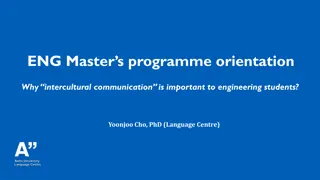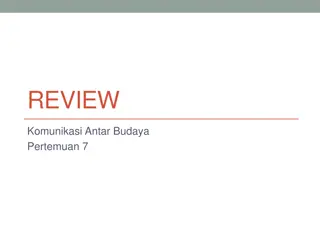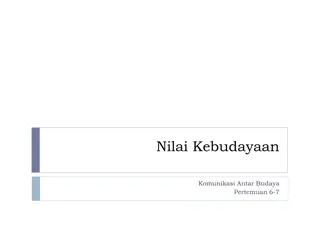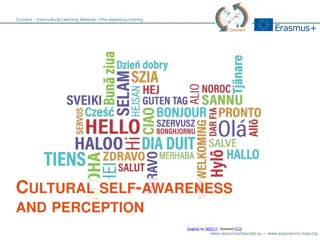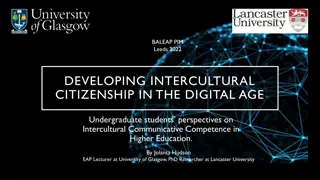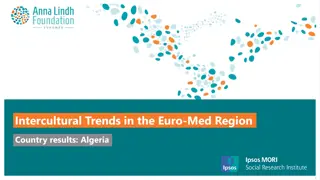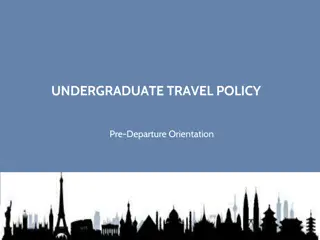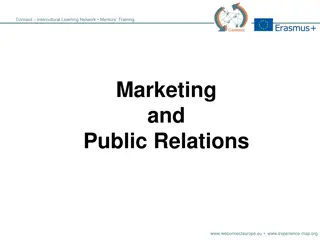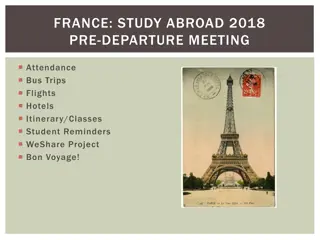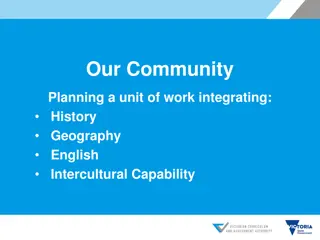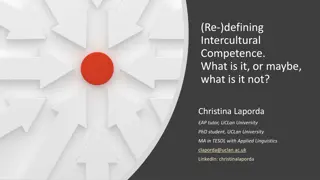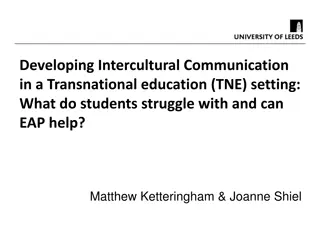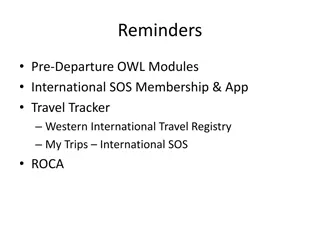Connect Intercultural Learning Network Pre-departure Training
Explore the Connect Intercultural Learning Network's pre-departure training agenda focusing on intercultural acting, communication strategies, cross-cultural miscommunications, and the significance of cultural scripts. Enhance your skills in navigating intercultural conflicts and uncertainties to become a more effective communicator in diverse environments.
Download Presentation

Please find below an Image/Link to download the presentation.
The content on the website is provided AS IS for your information and personal use only. It may not be sold, licensed, or shared on other websites without obtaining consent from the author.If you encounter any issues during the download, it is possible that the publisher has removed the file from their server.
You are allowed to download the files provided on this website for personal or commercial use, subject to the condition that they are used lawfully. All files are the property of their respective owners.
The content on the website is provided AS IS for your information and personal use only. It may not be sold, licensed, or shared on other websites without obtaining consent from the author.
E N D
Presentation Transcript
Connect Intercultural Learning Network Pre-departure training Afro Afroamerikaner antworten asiatisch by rawpixel.com / licensed I INTERCULTURAL NTERCULTURAL A ACTING CTING CC0 www.weconnecteurope.eu www.experience-map.org
Connect Intercultural Learning Network Pre-departure training Agenda Agenda 1. Learning Goals 2. Warm-up: What is Intercultural Acting and why do we need to study it? 3. Culture and Communication 4. Approaches to Intercultural Communication a) Get a Grip on the Language b) Politeness in Different Cultures c) Language and Politeness www.weconnecteurope.eu www.experience-map.org
Connect Intercultural Learning Network Pre-departure training 1. Learning goals 1. Learning goals At the end of this unit you will: have reflected about your own linguistic and pragmatic behavioural norms and will get to know areas of potential differences in target country know essential terms of successful intercultural communication know strategies for dealing with uncertain situations be able to use meta-communicational and cultural skills to negotiate and mediate in intercultural conflict situations www.weconnecteurope.eu www.experience-map.org
Connect Intercultural Learning Network Pre-departure training 2. Warm Warm- -up up Cross-cultural miscommunications https://www.youtube.com/watch?v=ebRQQwzRo1o Share your own experiences of difficult cultural encounters (e.g. misunderstandings) and other situations of uncertainty What were possible reasons for conflicts/misunderstandings? What did you do/what would be possible strategies to resolve these conflict situations? www.weconnecteurope.eu www.experience-map.org
Connect Intercultural Learning Network Pre-departure training 3. Culture and Communication Anna Wierzbicka, about her own experience as a Pole living in Australia: I had to start learning new "cultural scripts"...and... I became aware of the old "cultural scripts"....I also became aware...of the reality of "cultural scripts" and their importance to the way one lives one's life, to the image one projects, and even to one's personal identity (Wierzbicka 2003: x) www.weconnecteurope.eu www.experience-map.org
Connect Intercultural Learning Network Pre-departure training Visible culture Invisible, under the surface (beliefs, values, worldview) Iceberg Modell on https://commons.wikimedia.org/wiki/File:IceBergModell.jpg licensed by Wikipedia Commons 6 www.weconnecteurope.eu www.experience-map.org
Connect Intercultural Learning Network Pre-departure training When Icebergs Collide When Icebergs Collide If we know their values we can explain their behavior. If we don t know their values and their behavior is different from ours, we often describe it both SUBJECTIVELY and NEGATIVELY Photo by JBL / licensed Royalty-Free www.weconnecteurope.eu www.experience-map.org
Connect Intercultural Learning Network Pre-departure training Breakdown Breakdown of of Communication Communication We are social animals When communication breaks down we experience pain and frustration In a cross-cultural encounter, communication may break down because of different communicative habits Photo by MoteOo / licensed CC0 www.weconnecteurope.eu www.experience-map.org
Connect Intercultural Learning Network Pre-departure training Definitions Definitions What is an intercultural situation? What is intercultural competence? Developing behaviour to communicate effectively and appropriately in a situation where people of different cultural backgrounds come together. It also includes thought patterns and non-verbal behaviour. We construct communicative situations by making different choices of behaviours www.weconnecteurope.eu www.experience-map.org
Connect Intercultural Learning Network Pre-departure training Defining intercultural communication Defining intercultural communication Intercultural communication aims at understanding the extent to which non-shared knowledge affects and modifies the retrieval of intended meaning Mismatches Intention and interpretation Limited mutual understandings Cultural biases www.weconnecteurope.eu www.experience-map.org
Connect Intercultural Learning Network Pre-departure training Why do we need to study Intercultural Why do we need to study Intercultural Communication? Communication? Watch this TedX Talk by Pellegrino Riccardi on Cross-cultural Communication: https://www.youtube.com/watch?v=YMyofREc5Jk&spfreload=10 individuals from different societies or communities carry out their interactions (whether spoken or written) according to their own rules or norms, often resulting in a clash of expectations and, ultimately, misperceptions about the other group. The misperceptions are typically two-way; that is, each group misperceives the other. (Boxer 2002: 151) Different rules of speaking have the potential to cause stereotypes, prejudices, discrimination against entire groups of people Cross-cultural interaction is the norm across societies and within them www.weconnecteurope.eu www.experience-map.org
Connect Intercultural Learning Network Pre-departure training Discomfort Discomfort & & cultural cultural differences (1) differences (1) Why doesn t he/she just say yes or no? In one culture, an indirect signal may signal indecisiveness, while in another culture it signals deference & respect. Why is he/she always staring at me? In one culture staring can signal aggressiveness or intimidation, while in another culture direct eye contact shows attention & esteem. Why does he/she have to be right in my face whenever he/she talks to me? In one culture the range of personal space can be much smaller than in another culture. Source: CCL, 2002 www.weconnecteurope.eu www.experience-map.org
Connect Intercultural Learning Network Pre-departure training Discomfort & cultural differences (2) Discomfort & cultural differences (2) Why doesn t he/she tell me if he/she doesn t understand something? In one culture, asking questions is accepted as an effective tool for communication, while in other cultures questioning superiors may signal insolence. Why does he/she sit there smiling while I am talking about his/her performance problems? In one culture, smiling during a discussion about performance problems may signal contempt and disinterest, while in another culture a smile may reflect sincerity and attention. Why does he/she make a joke about everything? In one culture, a joke can signal lack of confidence or seriousness, while in some others it's a sign of deference. Source: CCL, 2002 www.weconnecteurope.eu www.experience-map.org
Connect Intercultural Learning Network Pre-departure training Cultural Cultural Schemata Schemata Schema(ta): Pre-existing knowledge structures in memory that function like familiar patterns from previous experience that we use to interpret new experiences (Yule 1996: 85) Cultural schemata: Developed on the basis of our experiences in our culture People from different cultures might have different scripts, which might lead to misinterpretations or incorrect expectations E.g. eating your food in a restaurant with your hands Asking: 'How are you?' Answer: 'Fine, thanks.' (Not a real question but a greeting.) www.weconnecteurope.eu www.experience-map.org
Connect Intercultural Learning Network Pre-departure training Keep Keep in in mind mind.. .. 1. People reply from the background of their own culture when communicating and when interpreting what is communicated by others. Unsuccessful communication results from a lack/a lesser degree of shared cultural elements and background. the more open you are and the more relationships you build the more you will share and the more your intercultural acting will improve 2. www.weconnecteurope.eu www.experience-map.org
Connect Intercultural Learning Network Pre-departure training 4. Approaches to Intercultural Communication 4. Approaches to Intercultural Communication a) Working on your language skills b) Politeness Theories c) Interactional Approaches www.weconnecteurope.eu www.experience-map.org
Connect Intercultural Learning Network Pre-departure training a) Language a) Language Language proficiency Semantics Metaphor Culture-dependent language use There are different social and cultural norms inherent in different languages get a good grip on the language! Photo by 905530 / licensed CC0 www.weconnecteurope.eu www.experience-map.org
Connect Intercultural Learning Network Pre-departure training b) Politeness in Different Cultures b) Politeness in Different Cultures i. Brown & Levinson 1987: Face; Positive face and negative face; Face Threatening Acts Other Politeness Theories ii. Photo by coffeebeanworks / licensed CC0 www.weconnecteurope.eu www.experience-map.org
Connect Intercultural Learning Network Pre-departure training i) Brown & Levinson (1987): Face Negotiation Theory i) Brown & Levinson (1987): Face Negotiation Theory Face = Face = The public self-image of a person (emotional and social sense of self one has and expects everyone else to recognise) (Yule 1996: 60) Face is the image we want to portray to others Depending on the situation, Face changes www.weconnecteurope.eu www.experience-map.org
Connect Intercultural Learning Network Pre-departure training positive positiveface member of the same group, to know that wants are shared by others. face: : need to be accepted/liked, to be treated as a Photo by Free-Photoss llicensed CC0 negative negativeface action, not be imposed on by others face: : need to be independent, to have freedom of www.weconnecteurope.eu www.experience-map.org Photo by PublicDomainPictures / licensed CC0
Connect Intercultural Learning Network Pre-departure training Face Face and and interaction interaction Intercultural situations are sites for potential loss of face => face work must be a part of talk if loss of face is to be avoided and co-operation is to be maintained. Photo by RawPixel / licensed CC0 www.weconnecteurope.eu www.experience-map.org
Connect Intercultural Learning Network Pre-departure training Negative Negative politeness politeness Avoids imposition Respects the other s need for freedom of action and independence Tends to show deference, emphasises the importance of the other's time or concerns, and may include an apology for the imposition *hedge/hedging is one technique of negative politeness - the use of words or phrases that express a degree of qualification or uncertainty, e.g. sort of, kind of, perhaps www.weconnecteurope.eu www.experience-map.org
Connect Intercultural Learning Network Pre-departure training Negative Negative politeness politeness expressions expressions and features and features Modal verbs Apologies for the imposition Hesitations Questions (even asking for permission to ask a question) + more indirect approach softens refusal Examples: Apology: sorry (It was an accident.) Apology-acceptance: that s ok (Not important) Request: if you can/could you please..? (It s up to you.) Request-acceptance: yes (I m willing.) Gratitude (offer-acceptance): thanks (You didn t have to do it.) => Deference strategy www.weconnecteurope.eu www.experience-map.org
Connect Intercultural Learning Network Pre-departure training Positive Positive politeness politeness Supports/ enhances participant s positive face Attends to the need of being part of the group, of being accepted and liked Will tend to show solidarity, emphasise that both speakers want the same thing and have a common goal www.weconnecteurope.eu www.experience-map.org
Connect Intercultural Learning Network Pre-departure training Positive Positive politeness politeness expressions expressions Greeting: hello (We have a relation.) Farewell: see you later (We still have one) Hedged criticism: if you don t mind me saying so (I won t damage our relation) Address: mate (We re in this together.) Hidden disagreement: I ll think about it (Japanese) (I don t want to offend you.) Hidden telling: isn t it? (You re the expert.) => Solidarity strategy www.weconnecteurope.eu www.experience-map.org
Connect Intercultural Learning Network Pre-departure training Which strategy, do you think, is more common in most English-speaking contexts? Have you experienced a culture where this is different? www.weconnecteurope.eu www.experience-map.org
Connect Intercultural Learning Network Pre-departure training Face Threatening Acts (FTA) Face Threatening Acts (FTA) when a person says something that represents a threat to another individual's expectations regarding self-image (Yule 1996: 61) www.weconnecteurope.eu www.experience-map.org
Connect Intercultural Learning Network Pre-departure training Positive Positive FTAs FTAs An act that threatens the need to be accepted/liked/treated as member of same group E.g. disapproval, criticism, complaints, accusations, contradictions, disagreements E.g. Criticism: I don t think your report was concise enough. The hearer s positive face is threatened because s/he is blamed for having done something badly, i.e. his/her self-image is negatively evaluated. www.weconnecteurope.eu www.experience-map.org
Connect Intercultural Learning Network Pre-departure training Negative Negative FTAs FTAs An act that threatens the need to be independent/have freedom of action/not be imposed on orders/requests, suggestions/advice, reminding, threats/warnings/dares offers/promises, compliments, expressions of emotions E.g. Order: Please give me that book. The speaker expresses an anticipation of some future action of the hearer and thereby restricts his/her personal freedom. www.weconnecteurope.eu www.experience-map.org
Connect Intercultural Learning Network Pre-departure training ii) Other politeness theories ii) Other politeness theories Brown & Levinson s (1987) have been criticised for their theory for being too much centred on Western ways of communication For example: Face theory sees people as individuals more than as social beings => independence (see negative face) and individual needs and feelings are in the foreground, which is a feature of Western cultures, while in other cultures, public images and the community as an evaluator of one s needs is more important => keeping and losing face/honour in front of the (local) community in Chinese and Japanese cultures is far more important (see Mao 1994) Also: According to face theory, by being polite and constantly attending to other people s faces we tend to lose our own face (by apologising, requesting, etc.) => other cultures may see it as more important to look after one s own face (Chen 2001) www.weconnecteurope.eu www.experience-map.org
Connect Intercultural Learning Network Pre-departure training Newer theories aim to be inclusive of other cultures (e.g. Leech 2005; Al- Duleimi et al., 2016): There are no universals (principles of politeness are not the same everywhere) But there are also no absolute differences (there is no absolute divide between the individualist, egalitarian West and the collective, group culture East ) There are scales of differences, both group and individual values need to be respected Grand Strategy of Politeness (Leech 2005): In order to be polite, we express/imply meaning that places a higher value on the addressee and a lower value on ourselves www.weconnecteurope.eu www.experience-map.org
Connect Intercultural Learning Network Pre-departure training Of course we are not always polite (moods, social situation, impoliteness expressed in irony, etc.) We use scales to assess the appropriate degree of politeness i. ii. Vertical distance between speaker and hearer Horizontal distance (degree of intimacy, familiarity, solidarity, deference) iii. Weight and value (social distinction attached to what is transacted) iv. Strength of socially-defined rights and obligations attached to different roles (guest, host, teacher, student) v. Self-territory and other-territory (membership in in-group or out-group) www.weconnecteurope.eu www.experience-map.org
Connect Intercultural Learning Network Pre-departure training Acceptance Invitation Denial www.weconnecteurope.eu www.experience-map.org
Connect Intercultural Learning Network Pre-departure training Example Example A: You coming down early? B: Well, I got a lot of things to do before getting cleared tomorrow. I don t know. I w- probably won t be too early. P: How about going out for a drink tonight? R: (0.2) tuh-uh sorry b d I can make it = c z Jill has invited some ve her friends over. Perhaps some other time. www.weconnecteurope.eu www.experience-map.org
Connect Intercultural Learning Network Pre-departure training c) Language and Politeness c) Language and Politeness Photo by StartupStockPhotos / licensed CC0 www.weconnecteurope.eu www.experience-map.org
Connect Intercultural Learning Network Pre-departure training Contrast Contrast: Greeks conversations conversations Greeks and and Germans Germans telephone telephone Pavlidou (2000) examined telephone conversations in Greek and German and found marked differences in the way Greeks and Germans manage each of the three sections of a telephone conversation, i.e., opening, main topic, closing: Greeks usually answer the phone with utterances like ne ('yes'), while it is more typical in German telephone calls for the answerer to identify himself/herself with his/her last name. Greeks seem to enter into quite a lengthy opening sequence, whereas Germans come to the point of their call much faster. Greeks use more phatic sequences in both social and transactional calls than Germans do. Greek closing sequences can be expected to be longer than German ones. www.weconnecteurope.eu www.experience-map.org
Connect Intercultural Learning Network Pre-departure training Activity Activity Watch this meeting clip Where might we encounter differences in an intercultural communication situation? www.weconnecteurope.eu www.experience-map.org
Connect Intercultural Learning Network Pre-departure training 1. 1. When to talk When to talk a) b) c) d) e) Silence can be highly valued. Some cultures believe it is inappropriate to talk to strangers. Familiarity vs. chance and amount of talk. Some don t talk when expected to by other groups. Stereotype of other a) Talking other b) Quiet other www.weconnecteurope.eu www.experience-map.org
Connect Intercultural Learning Network Pre-departure training 2. What to say 2. What to say a) b) c) d) e) Some cultures never ask the question why . Some cultures rarely ask questions. Talk and learn through story telling. (Not) Talking about personal experience or emotional involvement Downplaying and upgrading utterance www.weconnecteurope.eu www.experience-map.org
Connect Intercultural Learning Network Pre-departure training 3. Pacing and pausing 3. Pacing and pausing a) b) Speed rate Waiting to make sure that the previous speaker has finished, before taking one s own turn to speak Waiting for a moment between turns c) www.weconnecteurope.eu www.experience-map.org
Connect Intercultural Learning Network Pre-departure training 4. Listenership 4. Listenership a) b) c) Eye gaze used and broken by speaker and listener Steady eye contact during the talk Showing attention and encouragement www.weconnecteurope.eu www.experience-map.org
Connect Intercultural Learning Network Pre-departure training 5. Intonation 5. Intonation a) b) c) Intention and Interpretation Rudeness Stereotyping www.weconnecteurope.eu www.experience-map.org
Connect Intercultural Learning Network Pre-departure training 6. Formulaicity and poetic usage 6. Formulaicity and poetic usage a) Frequency b) Meaning c) Cultural context www.weconnecteurope.eu www.experience-map.org
Connect Intercultural Learning Network Pre-departure training 7. Indirectness 7. Indirectness Ideally, people should say what they mean and people should be accountable only for what they say in words . a) b) c) Straight to the point Necessity of small talk Never-say-NO talk www.weconnecteurope.eu www.experience-map.org
Connect Intercultural Learning Network Pre-departure training 8. Cohesion and coherence 8. Cohesion and coherence a) b) c) Repetition Syntactic position of main point Location of new information and old information www.weconnecteurope.eu www.experience-map.org
Connect Intercultural Learning Network Pre-departure training Interpretation and meta Interpretation and meta- -communication communication In different societies, and different communities, people speak differently, in a profound and systematic way, Therefore we need to learn how to.. reflect on our own communicative ways interpret other people s behaviour master difficult situations by communicating and acting in an appropriate way in the other culture www.weconnecteurope.eu www.experience-map.org
Connect Intercultural Learning Network Pre-departure training Traits that correlate with effective intercultural Traits that correlate with effective intercultural interaction interaction Tolerance to ambiguity, don t avoid uncertain situations Suspend judgement Be open-minded and flexible www.weconnecteurope.eu www.experience-map.org
Connect Intercultural Learning Network Pre-departure training Simulation Simulation Game Game www.weconnecteurope.eu www.experience-map.org
Connect Intercultural Learning Network Pre-departure training Step 4: Questions Step 4: Questions If you could describe the game in one word, what would it be? When did you realise that something was wrong? How did you deal with it? What word best describes your feelings during this game? What specific real-life situations does this game remind you of? Choose one of these real-life situations. What are the underlying causes of the problems or difficulties? What does the game suggest about what to do when you are in a similar situation in the real world? What did you do during the game that "worked" for you? www.weconnecteurope.eu www.experience-map.org
Connect Intercultural Learning Network Pre-departure training Step 5: Meta Step 5: Meta- -communication communication may be expressed directly in speech by such means as I m only joking , This is serious , When I say X, I mean Y , This is only gossip, but ______ , I heard that _______ , I m speaking to you as a friend , and so on, but it is more often expressed indirectly by such things as tone of voice, intonation, gesture, posture, and facial expression. It is largely a matter of how something is said rather than what is said, or colloquially, It s not what he said but how he said it . The conceptual content of the message what is said is subordinated to what is evoked, revealed, or expressed in the manner of saying. (Tyler, 1978: 408) www.weconnecteurope.eu www.experience-map.org




